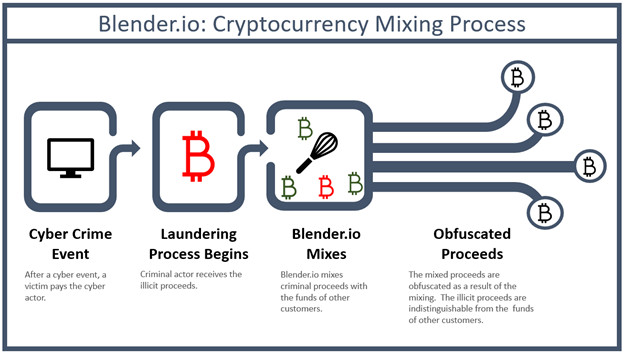US punishes Blender.io for helping North Korea launder millions in stolen Axie crypto
The US Treasury Department announced on Friday that it’s sanctioning Blender.io, essentially cutting the Bitcoin mixer off from the US financial system (legally speaking, anyway). The department alleges that the service, which lets people obfuscate the record usually kept by the blockchain, was used by North Korea to “support its malicious cyber activities and money-laundering of stolen virtual currency.”
According to the Treasury’s press release, Blender.io was used by the Lazarus hacking group to launder $20.5 million worth of the cryptocurrency it allegedly stole from the crypto-based game Axie Infinity. The entire proceeds of the hack, which the Treasury linked to Lazarus and North Korea in April, were estimated to be worth around $625 million at the time, though a few million dollars worth of funds have been recovered. The Treasury says that Lazarus is sponsored by North Korea’s government and that the country uses hackers to “generate revenue for its unlawful weapons of mass destruction (WMD) and ballistic missile programs.”
The Treasury’s press release says this is the first time it’s ever levied sanctions against a virtual currency mixer. (It has done other crypto-related sanctions, though; notably, last year, it issued its first sanction against an exchange.) Blender.io wasn’t the only tool the hackers used, though — to start, the funds stolen from Axie Infinity’s Ronin network were originally in Ethereum and USDC, and Blender works with Bitcoin; at some point, there had to be a conversion. There are also reports that the hackers filtered some of the funds through Tornado Cash, a service meant to make it harder to track transactions.
The US Treasury also alleges that Blender laundered money for ransomware organizations like Conti, Trickbot, and Sodinokibi (aka REvil). Now that it’s sanctioned, it won’t be able to access any of its funds that were stored within the US, nor can it do transactions with American companies or citizens.

Blender and other mixers work by pooling together deposited funds, then randomly distributing them. Because transactions are recorded on the blockchain, it can be very difficult to use stolen funds without using these types of services. Stolen coins go into the blender, and the hackers will, in theory, get clean coins back. (And whoever ends up with the stolen coins can point back to the mixer, saying “Well, you can see I didn’t take them out of the wallet myself.”)
As happened with the Axie hack, governments can sanction wallets that are affiliated with hacking groups, and researchers can track stolen crypto’s movement. If criminals want to convert their ill-gotten crypto into, say, Lamborghinis, they have to make sure that’s not being traced.
Of course, as the Treasury points out, there are perfectly legal uses for this kind of service — people could use them to gain some semblance of privacy when making purchases with crypto, for instance. But with the department keeping such a close eye on crypto crimes, it’s starting to feel like firms will have to be very careful about whose money they take and tumble.
The US Treasury Department announced on Friday that it’s sanctioning Blender.io, essentially cutting the Bitcoin mixer off from the US financial system (legally speaking, anyway). The department alleges that the service, which lets people obfuscate the record usually kept by the blockchain, was used by North Korea to “support its…
Recent Posts
- Quordle hints and answers for Wednesday, February 19 (game #1122)
- Facebook is about to mass delete a lot of old live streams
- An obscure French startup just launched the cheapest true 5K monitor in the world right now and I can’t wait to test it
- Google Meet’s AI transcripts will automatically create action items for you
- No, it’s not an April fool, Intel debuts open source AI offering that gauges a text’s politeness level
Archives
- February 2025
- January 2025
- December 2024
- November 2024
- October 2024
- September 2024
- August 2024
- July 2024
- June 2024
- May 2024
- April 2024
- March 2024
- February 2024
- January 2024
- December 2023
- November 2023
- October 2023
- September 2023
- August 2023
- July 2023
- June 2023
- May 2023
- April 2023
- March 2023
- February 2023
- January 2023
- December 2022
- November 2022
- October 2022
- September 2022
- August 2022
- July 2022
- June 2022
- May 2022
- April 2022
- March 2022
- February 2022
- January 2022
- December 2021
- November 2021
- October 2021
- September 2021
- August 2021
- July 2021
- June 2021
- May 2021
- April 2021
- March 2021
- February 2021
- January 2021
- December 2020
- November 2020
- October 2020
- September 2020
- August 2020
- July 2020
- June 2020
- May 2020
- April 2020
- March 2020
- February 2020
- January 2020
- December 2019
- November 2019
- September 2018
- October 2017
- December 2011
- August 2010